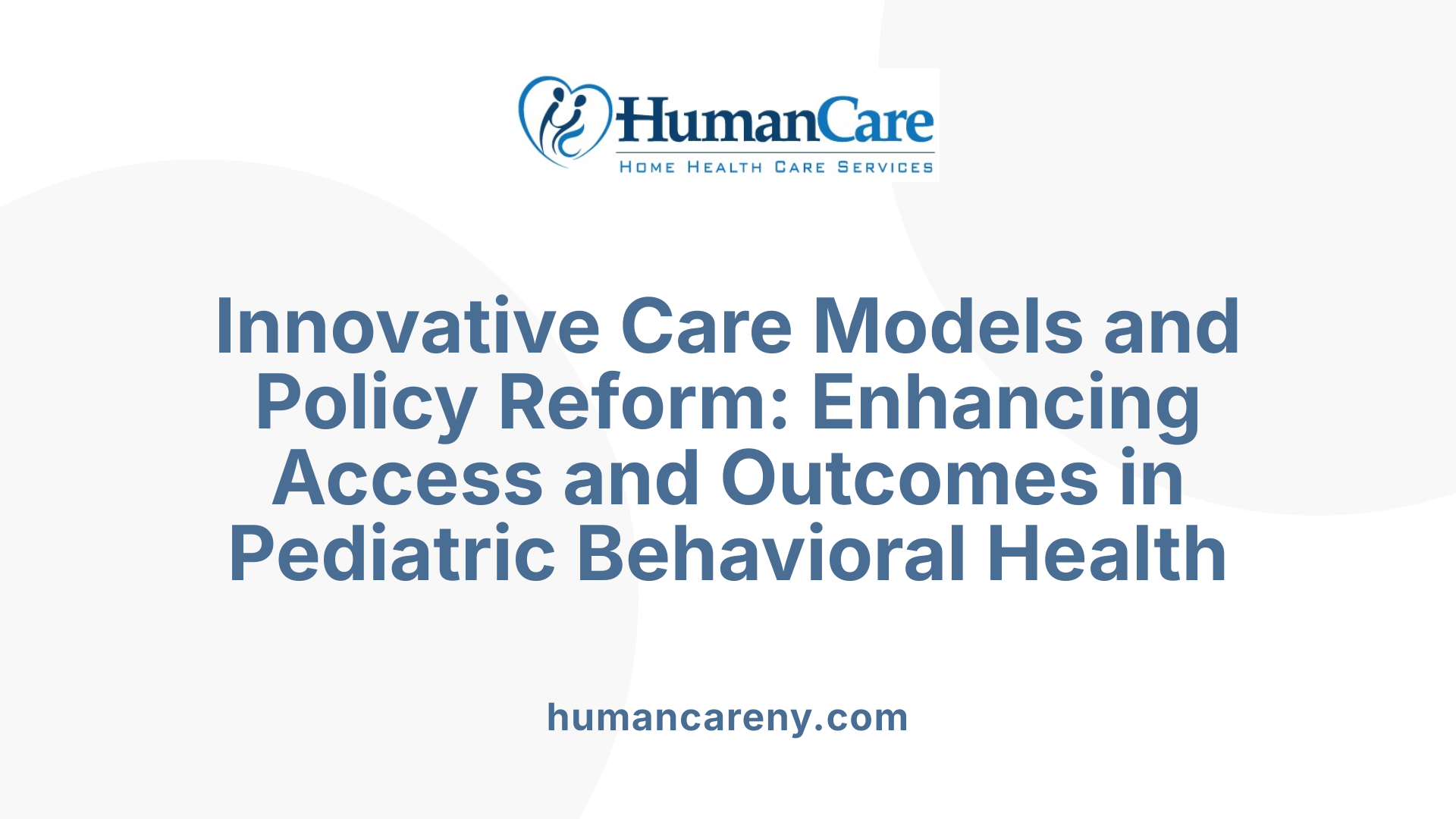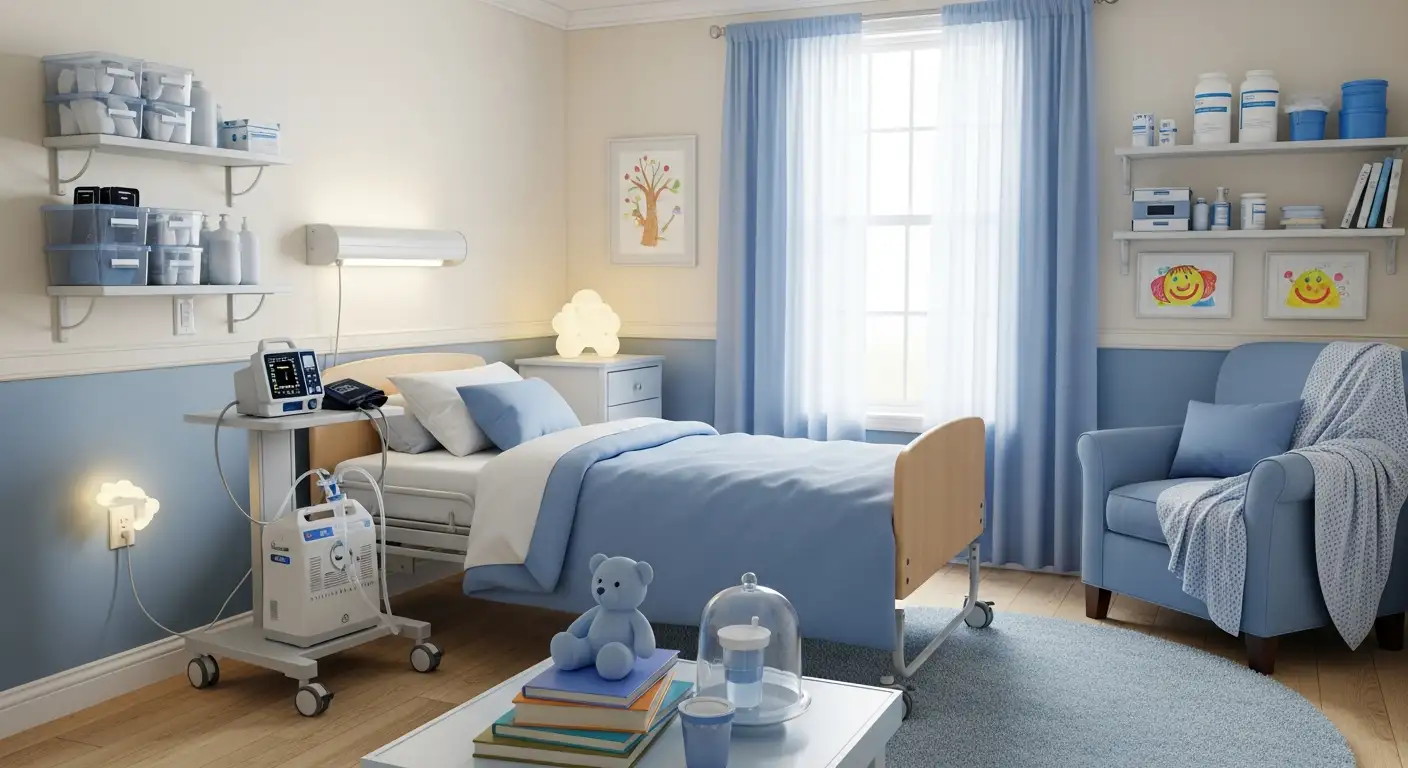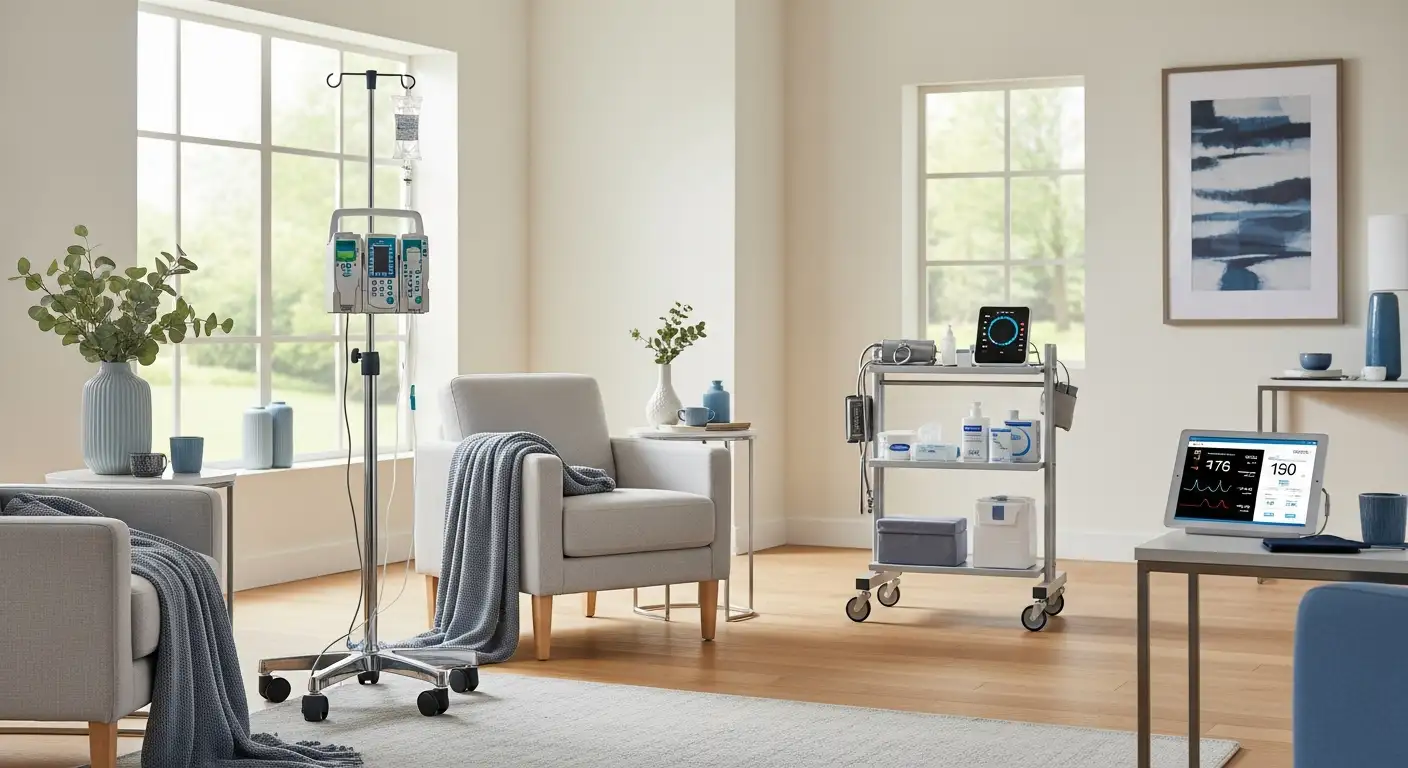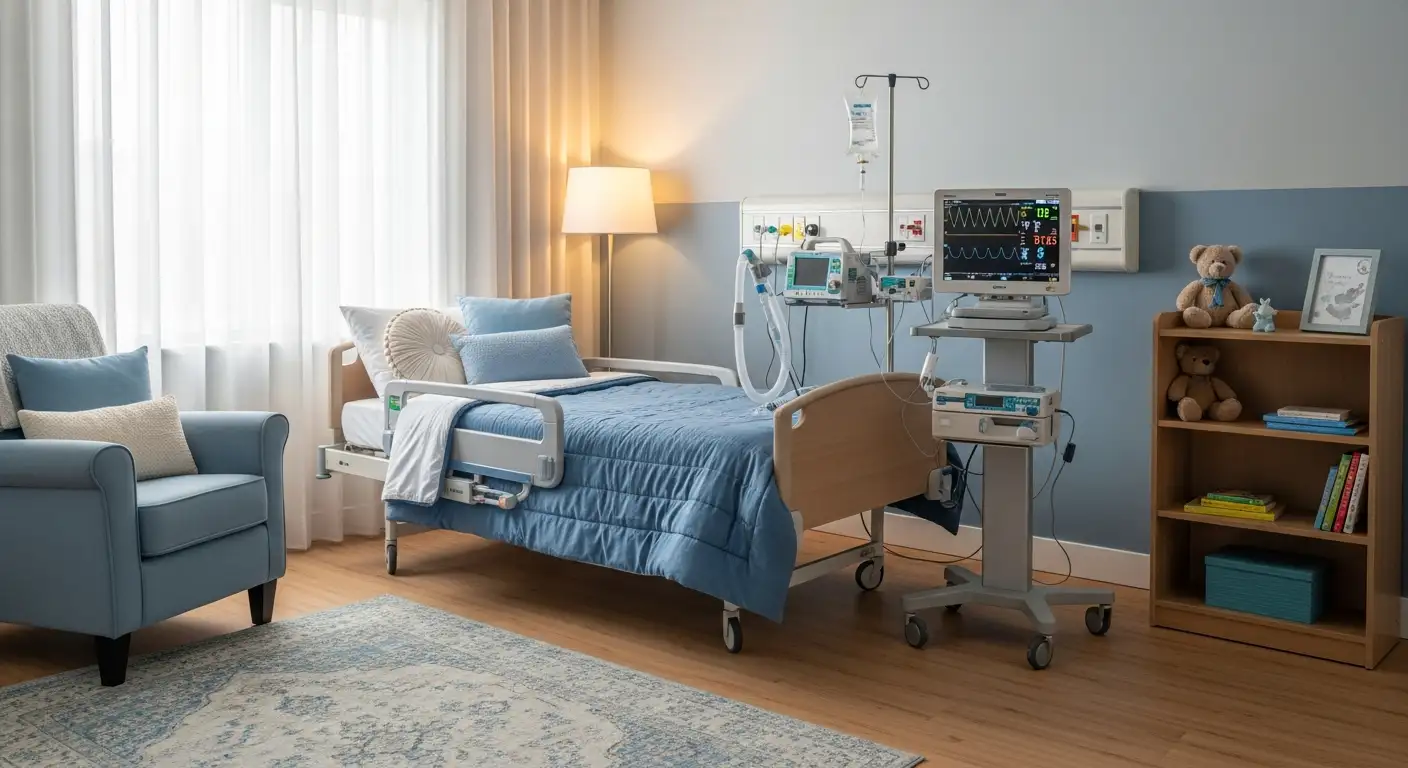Understanding the Role of Pediatric Home Care in Managing Behavioral Challenges
Pediatric home care has emerged as a vital component of child health, especially for children facing behavioral challenges. By providing personalized, holistic, and accessible support in the child's familiar environment, home care approaches effectively address emotional, behavioral, and medical complexities. This article explores how pediatric home care articulately integrates evidence-based interventions, system reforms, and community partnerships to improve outcomes for children with behavioral health issues.
Personalized, Family-Centered Care for Behavioral Health

How are individualized care plans developed to meet each child's unique needs?
Creating personalized care plans involves a comprehensive assessment of the child's medical, developmental, and behavioral challenges. Pediatric home care teams collaborate closely with families, healthcare providers, and therapists to tailor interventions that address specific health conditions, emotional needs, and daily routines. These plans are dynamic, regularly reviewed, and adjusted based on the child's progress and changing circumstances, ensuring that care remains relevant and effective.
Why is family and caregiver involvement crucial in managing behavioral health?
Family participation is fundamental to successful behavioral management. Caregivers are trained to implement therapeutic strategies, manage medications, and support behavioral interventions. Engaging families provides emotional support and promotes consistency in routines, which enhances treatment outcomes. Programs like Wraparound emphasize family-driven, youth-guided models, empowering families to be active partners in care and decision-making.
How does technology enhance support tools in pediatric home care?
Technological advances such as telemedicine, remote monitoring devices, and communication apps allow healthcare providers to oversee child's health in real-time. These tools facilitate early detection of issues, provide immediate guidance, and improve coordination among multidisciplinary teams. Assistive technologies like communication aids and sensory tools further support independence and social participation, contributing to positive behavioral and emotional outcomes.
What are effective strategies for caregivers to handle behavioral issues in children?
Effective strategies include staying calm, assessing the underlying causes of behavior, and using positive reinforcement techniques. Clear expectations, consistency, and involving professionals for tailored interventions are vital. Coordinated support models like Wraparound strengthen these efforts by fostering collaboration among families, community resources, and healthcare providers.
What are the benefits of pediatric home care for children with behavioral challenges?
Home care offers the advantage of providing interventions in a familiar, comfortable environment, which can reduce stress and improve cooperation. It promotes family empowerment through caregiver education and involvement. As a result, children often experience better emotional well-being, improved behavior, and fewer hospital visits.
| Aspect | Details | Additional Notes |
|---|---|---|
| Care Plan Development | Tailored to child's specific needs | Based on assessments, reviews, and updates |
| Family Engagement | Active participation in routines and decision-making | Enhances consistency and empowerment |
| Technology Use | Telehealth, remote monitoring, assistive devices | Supports early intervention and independence |
| Behavioral Strategies | Calm responses, positive reinforcement, collaboration | Improves behavior management and family support |
| Benefits of Home Care | Reduced hospital visits, personalized support | Promotes emotional well-being and family resilience |
The System of Care: Evidence-Informed Models and Policy Impacts

Wraparound care coordination
High fidelity Wraparound is an evidence-based, intensive care coordination approach tailored for children with behavioral health challenges. It emphasizes personalized care plans, small caseload ratios such as 1:10, and the involvement of full-time care coordinators. The model actively includes family and youth peer support, promoting family-driven and youth-guided interventions. This holistic approach reduces unnecessary hospitalizations and residential treatment, leading to significant Medicaid savings—often between $20,000 and $40,000 annually per child.
Integrated, family-driven care models
Effective pediatric home care hinges on coordination with primary care providers and other specialists. Ensuring children have identified primary care physicians and receive appropriate behavioral health screenings is fundamental. These models prioritize frequent face-to-face interactions and active family involvement, differing from adult care approaches for serious mental illness. Programs like Wraparound and other family-centered models foster trust, improve health outcomes, and support behavioral management.
System reforms for improved access and quality
Policy reforms are vital to overcoming current challenges, such as workforce shortages, insurance gaps, and uneven service delivery. Strategies include promoting integrated care frameworks like Wraparound, expanding Medicaid reimbursement to cover comprehensive home-based services, and leveraging telehealth technologies to extend reach, especially in underserved areas. Workforce capacity enhancements through specialized training and higher wages are essential to retain skilled staff.
How do systemic approaches and research inform pediatric behavioral health care?
Research and program data have been central to guiding the development of innovative care models, such as collaborative care and integrated primary mental health services. These approaches facilitate early detection, tailored interventions, and seamless service delivery, ultimately improving access and outcomes. Continuous evaluation helps to refine policies and practices, ensuring they meet the evolving needs of children and families.
What systemic and policy approaches can improve behavioral health support in pediatric home care?
Policy strategies should promote integrated models like Wraparound, expand Medicaid reimbursement, support telehealth expansion, and bolster workforce training. These measures aim to create an equitable, family-centered system that reduces disparities and enhances the quality of care available to children with complex behavioral health needs.
| Model/Approach | Focus Area | Impact | Additional Notes |
|---|---|---|---|
| Wraparound Care Coordination | Intensive, holistic planning for children with behavioral needs | Decreases hospitalizations, cost savings at Medicaid | Family and youth engagement essential |
| Integrated Care Models | Collaboration among pediatric, behavioral health, and primary care | Enhanced access, early intervention | Supported by research and policy reforms |
| Telehealth Expansion | Remote consultations, monitoring, and service delivery | Increased reach, reduced disparities | Addresses workforce shortages |
| Workforce Training & Support | Education and incentives for pediatric care providers | Improved care quality, staff retention | Essential for sustained model success |
Building on existing infrastructures—like community care teams and embedded mental health providers—system reforms aim to foster a cohesive, family-centered system. Such efforts support children with complex needs by promoting culturally responsive, trauma-informed services. As research continues to shed light on effective strategies, policy efforts should focus on sustainable funding, workforce development, and technology integration to ensure all children receive comprehensive, high-quality care.
Incorporating Evidence-Based Therapies and Interventions

What types of therapies support behavioral health in children receiving home care?
Children receiving pediatric home care benefit from a range of therapeutic approaches tailored to their developmental and emotional needs. Evidence-based therapies like Parent-Child Interaction Therapy (PCIT) and PC-CARE have gained popularity due to their focus on strengthening positive parent-child relationships through live coaching, which is conducted in the natural environment of the home.
In addition to parent-focused therapies, behavioral interventions such as behavioral therapy and cognitive-behavioral therapy (CBT) are crucial. These therapies help children develop better emotional regulation skills, reduce disruptive behaviors, and improve social interactions. Family therapies, involving multiple family members, are also effective in addressing complex family dynamics and providing a supportive framework for behavioral intervention.
The integration of these therapeutic strategies within home-based care maximizes their effectiveness by addressing behaviors in real-life contexts where children typically display challenges.
What are best practices for ensuring emotional and behavioral well-being in pediatric home care?
Ensuring children's emotional and behavioral well-being at home involves several best practices. First, establishing predictable routines provides children with a sense of stability, reducing anxiety and offering behavioral cues that promote cooperation.
Open communication between caregivers and healthcare professionals fosters trust and allows issues to be addressed promptly. Modeling healthy behaviors, such as calmness during stressful situations or positive social interactions, exemplifies desirable behaviors for children.
Multidisciplinary teams—including behavioral health specialists, social workers, and medical providers—should collaborate to develop individualized and culturally sensitive care plans. These plans often incorporate family strengths and address social determinants of health, supporting the child's overall well-being.
Involving families in therapeutic processes and caregiver training ensures that strategies are consistently applied, leading to better behavioral outcomes and emotional resilience for children in home care settings.
Physical Activity and Behavioral Improvement
How can pediatric home care support children with behavioral challenges?
Pediatric home care plays a vital role in supporting children with behavioral challenges by creating personalized routines that include physical activity and therapeutic exercises. Care providers are trained to incorporate movement-based activities such as outdoor play, sensory integration exercises, and developmentally appropriate physical therapy into daily routines. This approach not only helps manage behavioral symptoms but also involves families actively—training parents in activity-based strategies ensures consistency and reinforcement at home.
Involving families in these routines fosters emotional regulation and builds social skills, making home care a comprehensive, supportive environment for growth. By tailoring interventions to each child's specific needs, providers ensure that physical activity becomes a core component of behavioral management.
How does physical activity influence behavior in children?
Exercise benefits children beyond physical health; it also has profound effects on their mental health and behavior. Physical activity releases endorphins, the body’s natural mood lifters, which help reduce feelings of anxiety and depression. It also lowers levels of stress hormones like cortisol and adrenaline, which are often elevated in children experiencing behavioral problems.
Research shows that regular structured exercise can decrease behavioral outbursts, impulsivity, and hyperactivity. This is particularly true for children with ADHD, autism spectrum disorders, and anxiety conditions, who often exhibit behavioral improvements with increased physical activity. These benefits support the inclusion of movement in daily routines to promote better behavior and emotional regulation.
Incorporating movement into routines
Integrating physical activity into everyday routines can be simple and enjoyable. Outdoor play, whether through sports, nature walks, or free exploration, encourages children to be active in a low-stress environment. Creating opportunities for movement during indoor activities, such as interactive games, dance, or online movement-based programs, helps children stay active regardless of weather.
Modeling these behaviors and combining movement with learning—like reading while walking or doing physical exercises with educational content—can sustain children’s interest and participation. Consistent, developmentally appropriate physical activity is a proven strategy to improve children's behavior, emotional well-being, and overall developmental progress.
Supporting Children with Medical and Behavioral Complexities

What role does pediatric home care play in managing medical and behavioral complexities in children?
Pediatric home care is essential for children facing complex health challenges. It provides tailored, continuous support directly in the child's familiar environment. Home care services include symptom management, medication administration, and ongoing health monitoring, which help prevent hospital visits and facilitate recovery.
Moreover, home care enables early detection of health issues, minimizing the risk of emergencies. This proactive approach is especially critical for children with chronic illnesses like asthma, diabetes, or epilepsy. The involvement of qualified healthcare providers—such as nurses, therapists, and social workers—ensures that children receive holistic, patient-centered care.
Families gain confidence and relief knowing that skilled professionals support their child's medical routines and behavioral needs. Training caregivers, integrating assistive technologies, and coordinating with primary care providers are also vital parts of effective pediatric home management. Ultimately, these efforts foster better health outcomes and improved daily life for children with complex health needs.
What systemic approaches and research inform pediatric behavioral health care?
Advancements in pediatric behavioral health care are driven by systemic approaches like integrated care models and family-driven interventions. Wraparound services exemplify this, offering intensive, individualized care coordination that involves families, youth, and multidisciplinary teams.
Research highlights the effectiveness of programs like High Fidelity Wraparound, which employs small caseloads, full-time coordinators, and peer supports to improve outcomes while reducing costs. These evidence-informed strategies lead to reduced hospitalizations and residential treatment, saving Medicaid dollars—often between $20,000 and $40,000 annually per child.
Systemic frameworks advocate for incorporating measurement-based practices, ensuring services are tailored and data-driven. Policies aim to improve service accessibility, avoid duplication, and build on existing community infrastructure. Continuous research and program evaluations are crucial to refining interventions, understanding holistic outcomes valued by families, and ensuring equitable, trauma-informed care.
How does technology support care delivery and address workforce shortages?
Technology plays a pivotal role in enhancing pediatric care. Telehealth services bridge geographical gaps, linking families, home nurses, and specialists to facilitate timely consultations and reduce hospital visits. Remote monitoring devices enable real-time tracking of vital signs and health indicators, allowing early intervention.
During workforce shortages, particularly in specialized pediatric home health, telehealth offers a practical solution by expanding provider reach and delivering training support. Digital platforms also support workforce training, data sharing, and collaboration among care teams.
Innovative technologies, when integrated into care models, improve efficiency, patient safety, and family satisfaction. They also help address some of the persistent staffing challenges by enabling care to be delivered in a cost-effective and accessible manner.
| Aspect | Description | Supporting Elements |
|---|---|---|
| Management of chronic conditions | Continuous, personalized support reduces hospitalizations and complications | Skilled providers, assistive tech, caregiver training |
| Role of technology in care delivery | Telehealth, remote monitoring, digital collaboration tools | Increased access, real-time data, workforce support |
| Overcoming workforce shortages | Use of telehealth, training programs, policy reforms | Expanded reach, enhanced skills, resource sharing |
By combining systemic strategies, innovative technology, and a dedicated workforce, pediatric home care continues to evolve as a vital system supporting children with medical and behavioral complexities.
Therapies and Support Mechanisms within Home Settings
Supporting developmental delays and autism spectrum disorder
Pediatric home care plays a crucial role in supporting children with developmental delays and autism spectrum disorder (ASD). Customized therapies such as speech therapy, occupational therapy, and behavioral interventions are integrated into daily routines. These therapies aim to enhance communication, motor skills, social interaction, and emotional regulation. Assistive devices and sensory tools are also employed to foster independence and participation, helping children reach developmental milestones in familiar, comfortable environments.
Post-surgical and chronic condition care
Children recovering from surgery or managing chronic conditions benefit significantly from specialized home health care services. Skilled nurses monitor wound healing, manage medications, and provide pain relief within the home, reducing the need for hospital visits. For chronic diseases like asthma, diabetes, or epilepsy, home care includes ongoing observation, medication administration, and symptom management. This continuous support minimizes health crises and promotes better disease control.
Behavioral and sensory therapies
Behavioral and sensory therapies are fundamental components of pediatric home health services. These include behavioral modification techniques, sensory integration, and social skills development tailored to each child's needs. Therapists work closely with families to implement strategies that reduce behavioral issues and enhance coping skills. Throughout these interventions, assistive technology such as communication devices assists children in expressing themselves and engaging meaningfully in daily activities.
How can pediatric home care support children with behavioral challenges?
Home care environments provide unique opportunities for continuous, individualized support for children with behavioral challenges. Frequent face-to-face interactions allow for real-time assessment and behavior management. Caregivers and therapists can educate families on behavioral strategies, ensuring consistency and reinforcement across settings. This integrated approach fosters emotional resilience, improves social skills, and promotes positive behavioral outcomes.
Supportive therapies like speech, occupational, and behavioral therapies, along with assistive technology, help improve communication, motor skills, and social functioning.
Home care creates a supportive setting for therapy, caregiver education, and consistent monitoring, which together promote adaptive skills and emotional resilience.
Workforce Challenges and Technological Innovations
What are the challenges faced by pediatric home health providers in addressing behavioral issues?
Pediatric home health providers often encounter significant obstacles, primarily workforce shortages and burnout among skilled nursing and therapy staff. Many providers report inadequate training tailored to complex behavioral health needs, which further hampers effective care delivery. These issues are compounded by high staff turnover and high demand for specialized skills, creating gaps that threaten continuous support for children with behavioral challenges.
In addition to staffing problems, logistical barriers such as limited resources, high workload, and administrative burdens can reduce the quality of care and delay intervention. These challenges not only impact health outcomes but also place emotional strain on both families and care teams.
How can pediatric home care support children with behavioral challenges?
Despite these hurdles, technological innovations offer promising solutions. Telehealth and remote monitoring have become essential tools, enabling healthcare professionals to conduct virtual visits, monitor vital signs, and adjust treatments in real-time. These tools improve access to specialist support, especially for families living in remote areas or facing transportation barriers.
By integrating advanced communication platforms, pediatric home care can deliver continuous, family-centered support that adapts to each child's needs. This approach fosters early identification of behavioral issues, prompt intervention, and ongoing management without overburdening the workforce.
Addressing workforce shortages
Strategies to address staffing gaps include expanding training programs focused on pediatric behavioral health, offering better wages and incentives, and improving work environments to reduce burnout. Partnerships with hospitals and community organizations can facilitate workforce development and provide shared resources.
Use of telehealth and remote monitoring
Telehealth platforms enable remote assessments and therapy sessions, reducing the need for in-person visits and allowing clinicians to reach more children effectively. Remote monitoring devices track vital signs, medication adherence, and behavioral cues, alerting providers to emerging concerns early.
Training and support for home health workers
Ongoing professional development is critical. Specialized training in behavioral health, communication skills, and cultural competence enhances care quality. Support networks, including peer supervision and mental health resources, help maintain staff well-being.
By combining workforce development with advanced technology, pediatric home care can better serve children facing behavioral health challenges. These innovations ensure timely, effective, and family-centered care that adapts to evolving needs, even amidst workforce constraints.
Community and Family Engagement for Better Outcomes
How can pediatric home care support children with behavioral challenges?
Pediatric home care plays a crucial role in supporting children facing behavioral challenges by involving families, schools, and community resources. This integrated approach helps create a comprehensive support network that addresses the child's medical, emotional, and developmental needs. Home-based care facilitates personalized interventions within familiar environments, reducing hospital visits and promoting emotional well-being.
Family involvement is central to effective care, as it empowers caregivers through education and training, enabling them to manage behavioral strategies and medical routines confidently. Additionally, collaboration with schools and community agencies ensures that children receive consistent support across different settings, fostering stability, growth, and overall well-being.
What systemic approaches and research inform pediatric behavioral health care?
Community-based, culturally responsive models are increasingly shaping effective pediatric behavioral health care. These approaches prioritize understanding diverse cultural backgrounds and addressing social determinants of health, making interventions more accessible and acceptable.
Research underscores the importance of family-driven, youth-guided programs such as Wraparound, which have demonstrated improved outcomes and cost savings. These models promote coordination across various systems, including behavioral health, child welfare, and education, to ensure equitable and tailored interventions. Continuous evaluation and data sharing are essential in refining these approaches, ultimately aiming to reduce disparities and enhance the quality of care for all children.
Additional Insights
| Aspect | Details | Additional Notes |
|---|---|---|
| Partnerships | Schools, community agencies, healthcare providers | Foster holistic support and resource sharing |
| Family Empowerment | Education, skill training, involving families in care | Enhances caregiver confidence and child stability |
| Disparity Reduction | Culturally responsive, trauma-informed care | Ensures equitable access and outcomes |
Engaging communities and families effectively transforms the landscape of pediatric behavioral health, leading to healthier, more resilient children and stronger support systems.
Concluding Insights and Future Directions
How does systemic research enhance pediatric behavioral health?
Integrating research findings into policy and practice ensures continuous improvement, equity, and sustainability in pediatric care. Research helps identify gaps, assess outcomes, and develop new models that better meet the diverse needs of children and families. It also guides resource allocation and policy reforms, enabling systems to adapt to evolving challenges and innovations.
What is the future outlook for pediatric home care in behavioral health?
Ongoing innovations—such as digital health tools, expanded workforce training, and systemic reforms—hold great promise for more comprehensive, accessible, and effective care for children. Telehealth and portable monitoring devices broaden reach, while policies focus on workforce resilience and equitable service delivery. These advancements aim to support children in familiar environments, reduce hospitalizations, and promote holistic development.
Innovation and policy priorities
Advancing pediatric home-based behavioral health involves adopting technology, fostering cross-sector collaboration, and ensuring culturally responsive, trauma-informed services. Policy efforts are increasingly directed at funding models that support workforce growth, integrated care systems, and community-based supports.
Empowering families and professionals
Empowering families through education and involvement in care planning is central to effective pediatric health care. Training and support for healthcare providers and home health workers are vital to address emotional challenges, reduce burnout, and enhance the quality of care.
| Aspect | Focus | Impact |
|---|---|---|
| Research | Data-driven policy | Improved system responsiveness and quality |
| Technology | Telehealth, remote monitoring | Expanded access and early intervention |
| Workforce | Training, retention | More sustainable, effective care delivery |
| Family Support | Education, empowerment | Better engagement and outcomes |
By prioritizing these domains, the future of pediatric home care in behavioral health aims for more equitable, innovative, and resilient systems that support the well-being of children and their families.
Building a Better Future for Children's Behavioral Health
Pediatric home care stands at the forefront of transforming behavioral health support for children. Through a combination of evidence-based therapies, systemic reforms, community engagement, and technological innovations, it offers a personalized, accessible, and holistic approach that can significantly improve outcomes. Continued investment in workforce development, research, and policy reform will be crucial to realize the full potential of home-based pediatric behavioral health care, ensuring every child has the opportunity to thrive in a supportive environment.
References
- [PDF] Customizing Health Homes for Children with Serious Behavioral ...
- Home Health Care Research for Children With Disability and ...
- Exploring 24/7 Pediatric Home Care: Essential Insights
- Caregiver and Provider Experiences of Home Healthcare Quality for ...
- Home Health Care For Children With Medical Complexity: Workforce ...
- At-Home Pediatric Care: Managing Children with Special Needs
- The Importance of Complex Care in Pediatric Home Health
- Shorter therapy for caregivers of children with behavioral challenges ...
- Children Behavioral Health - Casey Family Programs



